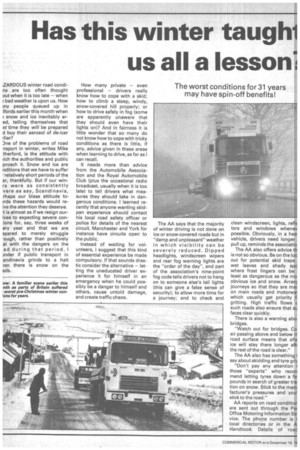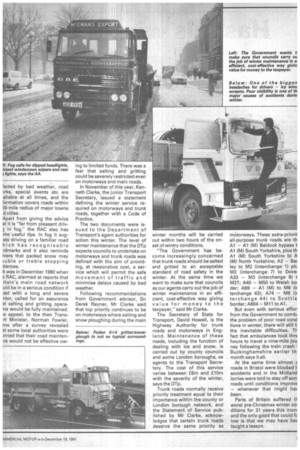Has this winter taughi us all a lessonl
Page 20

Page 21

If you've noticed an error in this article please click here to report it so we can fix it.
The worst conditions for 31 years may have spin-off benefits!
ZARDOUS winter road condins are too often thought out when it is too late — when ? bad weather is upon us. How Iny people queued up in !fords earlier this month when ? snow and ice inevitably ared, telling themselves that Kt time they will be prepared d buy their aerosol of de-icer rlier?
Dne of the problems of road nsport in winter, writes Mike therford, is the attitude with doh the authorities and public proach it. Snow and ice are nditions that we have to suffer
• relatively short periods of the ar, thankfully. But if our winrs were as consistently vere as say, Scandinavia, rhaps our blase attitude toirds these hazards would reive the attention they deserwe. t is almost as if we resign ourIves to expecting severe conions for, say, three weeks of ery year and that we are spared to merely struggle -ough, rather than positively al with the dangers on the ad during that period. I )nder if public transport in andinavia grinds to a halt len there is snow on the ads.
How many private — even professional — drivers really know how to cope with a skid; how to climb a steep, windy, snow-covered hill properly; or how to drive safely in fog (some are apparently unaware that they should even have their lights on)? And in fairness it is little wonder that so many do not know how to cope with tricky conditions as there is little, if any, advice given in these areas when learning to drive, as far as I can recall.
It needs more than advice from the Automobile Association and the Royal Automobile Club (plus the occasional radio broadcast, usually when it is too late) to tell drivers what measures they should take in dangerous conditions. I learned recently that anyone wanting skidpan experience should contact his local road safety officer or police for details of the nearest circuit. Manchester and York for instance have circuits open to the public.
Instead of waiting for volunteers, I suggest that this kind of essential experience be made compulsory, If that sounds drastic consider the alternative — letting the uneducated driver experience it for himself in an emergency when he could possibly be a danger to himself and others, cause untold damage, and create traffic chaos. The AA says that the majority of winter driving is not done on ice or snow-covered roads but in "damp and unpleasant" weather in which visibility can be severely reduced. Dipped headlights, windscreen wipers and rear fog warning lights are the "order of the day", and part of the association's nine-point fog code tells drivers not to hang on to someone else's tail lights (this can give a false sense of security); to allow more time for a journey; and to check and clean windscreen, lights, refl€ tors and windows whenev possible. Obviously, in a hea vehicle, drivers need longer pull up, reminds the associatio
The AA also offers advice th is not so obvious. Be on the loc out for potential skid traps wet leaves and shady spo where frost lingers can be least as dangerous as the mo obvious ice and snow. Arrant journeys so that they are mat on main roads and motorwa, which usually get priority f, gritting. High traffic flows c such roads also ensure that su faces clear quickly.
There is also a warning abo, bridges.
"Watch out for bridges. Co air passing above and below tlroad surface means that oftE ice will stay there longer aft the rest of the road is clear."
The AA also has something I say about skidding and tyre grit "Don't pay any attention those "experts" who recon mend letting tyres down a fa pounds in search of greater tral tion on snow. Stick to the mant facturer's pressures and you' stick to the road."
AA reports on road conditior are sent out through the Pot Office Motoring Information Se vice. The phone number is i local directories or in the A. Handbook. Details of road
feeted by bad weather, road 3rks, special events etc are ailable at all times, and the Formation covers roads within 50-mile radius of major towns d cities.
Apart from giving the advice at it is "far from pleasant driv3 in fog," the RAC also has me useful tips. In fog it sugsts driving on a familiar road hich has recognisable idmarks and it also reminds ivers that packed snow may )uble or treble stopping ;.tances.
It was in December 1980 when a RAC, alarmed at reports that itain's main road network uld be in a serious condition if ]ed with a long and severe nter, called for an assurance at salting and gritting operans would be fully maintained.
e appeal, to the then Transrt Minister, Norman Fowler, me after a survey revealed at some local authorities were )rriecl that their road maintence would not be effective ow ing to limited funds. There was a fear that salting and gritting could be severely restricted even on motorways and main roads.
In November of this year, Kenneth Clarke, the junior Transport Secretary, • issued a statement defining the winter service required on motorways and trunk roads, together with a Code of Practice.
The two documents were issued to the Department of Transport's agent authorities for action this winter. The level of winter maintenance that the DTp expects councils to undertake on motorways and trunk roads was defined with the aim of providing, at reasonaboe cost, a service which will permit the safe movement of traffic and minimise delays caused by bad weather.
Following recommendations from Government advisor, Sir Derek Rayner, Mr Clarke said that top priority continues to be on motorways where salting and snow ploughing during the main winter months will be carried out within two hours of the onset of wintry conditions.
"The Government has become increasingly concerned that trunk roads should be salted and gritted to an acceptable standard of road safety in the winter. At the same time we want to make sure that councils as our agents carry out the job of winter maintenance in an efficient, cost-effective way giving value for money to the taxpayer," said Mr Clarke.
The Secretary of State for Transport, David Howell, is the Highway Authority for trunk roads and motorways in England. Maintenance of these roads, including the function of dealing with ice and snow, is carried out by county councils and some London boroughs, as agents to the Transport Secretary. The cost of this service varies between £6m and £10m with the severity of the winter, says the DTp.
Trunk roads normally receive priority treatment equal to their importance within the county or London borough network, and the Statement of Service published by Mr Clarke, acknowledges that certain trunk roads deserve the same priority as motorways. These extra-priorit all-purpose trunk roads are th Al — Al (M) Baldock bypass t Al (M) South Yorkshire, plus th Al (M) South Yorkshire to A (M) North Yorkshire; A2 — Be) ley to M2 (interchange 11 plu M2 (interchange 71 to Dove A33 — M3 (interchange 8) t M27; A40 — M50 to Welsh bo der; A69 — Al (M) to M6 (it terchange 431; A74 — M6 (ir terchange 44) to Scottis border; A604— M11 to Al.
But even with serious effdr from the Government to combi the problem of poor road cond tions in winter, there will still L the inevitable difficulties. TF fact that ambulances took thrE hours to travel a nine-mile jou ney following the train crash i Buckinghamshire earlier th month says it all.
At the same time almost z roads in Bristol were blocked t accidents and in the Midland lorries were told to stay off sorr roads until conditions improvE — whenever that might ha% been.
Parts of Britain suffered tF worst pre-Christmas winter col ditions for 31 years this mom and the only good that could ft low is that we may have beE taught a lesson.






































